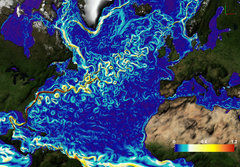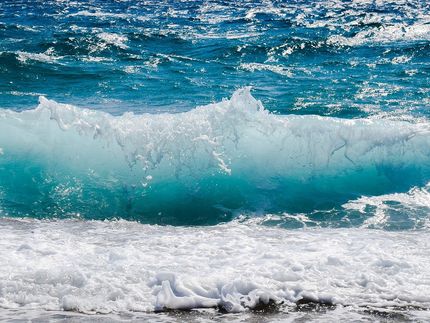The ocean - the long-term memory of our climate system
Advertisement
The oceans are a vital component of our climate system. Nevertheless, they are often represented at a very limited resolution in today's climate models, and important physical processes are sometimes missing entirely. 60 experts from 10 different countries will be in Kiel this week as part of an international workshop on the future developments in the field of ocean modeling. The meeting of the international CLIVAR research program is supported by the Cluster of Excellence "The Future Ocean" and the GEOMAR Helmholtz Centre for Ocean Research Kiel.

High resolution simulation of ocean currents in the North Atlantic.
GEOMAR
What causes climate variability on decadal time scales? Will the future Gulf Stream also remain stable? What impact do ocean currents off southern Africa have on the climate in Europe? As of today, such questions can only be answered partially at best since long time series measurements are scarce or not available. These questions can only be answered with the help of numerical simulations, for today’s scenarios as well as the future. The ocean models required to represent long-term experiments in particular, must greatly simplify the oceanic reality, in part due to the limited capacity of even modern supercomputers. Representatives of all major modeling centers come together in Kiel this week to discuss what the next generation of ocean models should look like.
"Especially in view of the expected climate warming, the crucial question is how much heat the ocean will absorb and how this energy is redistributed globally via ocean currents," explains Prof. Dr. Claus Böning from GEOMAR Helmholtz Centre for Ocean Research Kiel, co-organizer of the event. "During this workshop, we’ll discuss the strengths and weaknesses of the current models and plan strategies for future developments," Böning explained. The wish list is rather long: Higher resolution and better representation of physical processes are top priorities. But not all of the scientists’ wishes are also feasible. "Due to limitations in our mainframe capacities, our results will always be approximations of reality only," said Dr. Anne Marie Treguier from the Laboratoire de Physique of Océans at the French research center Ifremer. "We have to decide what are the processes that we cannot do without in our models, and how to best describe these" Treguier continued.
Even if the individual modeling groups always compete for the best models and results, a dialogue and exchange on an international level is useful and necessary. International research programs, such as CLIVAR (Climate Variability and Predictability) coordinated by the World Climate Research Programme, offer an opportunity to define coordinated comparison experiments between the modeling groups.
The focus of the meeting held in Kiel April 7-9 is on assessing the current state of knowledge, identification of important physical processes and their simulation in models, interaction with atmosphere and sea ice, as well as technical aspects of ocean modeling. "With the new insights gained during this meeting, scientists will be able to improve all of their models. The results, among others, will then also be included in the next climate status report of the Intergovernmental Panel on Climate Change (IPCC)," Prof. Böning concluded.























































